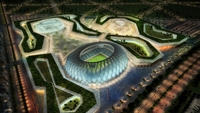Major technical challenges loom with future FIFA World Cups in Russia, Qatar

FIFA has chosen Russia and Qatar as hosts of the 2018 and 2022 World Cup games. The unexpected choices were made over strong bids from England, Spain, Portugal, Australia, the Netherlands, Belgium and the United States.
Russia and Qatar are being viewed as potentially risky choices for FIFA in that neither country is used to intense global TV coverage. Some view it as an extension of experiences at the South Africa World Cup: a risky and technically flawed venture that was successful in demonstrating that football can truly unite the world.
Russia is a country with one of the oldest and deepest football traditions, but it has been closed to outsiders for many years. The World Cup is a chance to change that, putting an extensive media light on the country.
However, it is Qatar that is the most risky choice. A World Cup in the Middle East is the strongest politically unifying statement football can make, but it doesn’t come without major obstacles. From intense summer heat and lack of stadiums to a poor technology infrastructure, the county will have to be essentially rebuilt.
In fact, in requesting FIFA to approve the games there, Qatar asked the organization to take a “bold gamble” by taking the World Cup to the Middle East for the first time in 2022. Qatar did an extensive presentation showing it had the finances, resources and technology to overcome logistical problems.
One of the greatest challenges is the heat. The tournament will be held when temperatures in Qatar typically exceed 118 degrees Fahrenheit. FIFA used its inspection report on the country to highlight the potential health risk posed by the heat, despite Qatar saying it will have air-conditioned stadiums, training facilities, broadcast and fan areas.
“We know it would be a bold gamble and an exciting prospect, but with no risk,” bid chief executive Hassan al-Thawadi said through a translator. “Heat is not and will not be an issue.”
Get the TV Tech Newsletter
The professional video industry's #1 source for news, trends and product and tech information. Sign up below.
Qatar promised to spend $50 billion on infrastructure upgrades and $4 billion to build nine stadiums and renovate three others. No stadium would be more than an hour apart, while many would be dismantled after the games, and sections will be sent to poor nations.
One of Qatar’s strongest arguments was that the World Cup will have a transformational effect in the region. Bid chairman Sheikh Mohammad bin Hamad Al-Thani said he hopes the games will present “a new image of the Middle East, far away from clichés and closer to reality.”
“We are offering FIFA a historical opportunity to expand the frontiers of the World Cup,” he said. “This involves a new mission, a new adventure. Football has a date with history. This page of history we can write together.”
